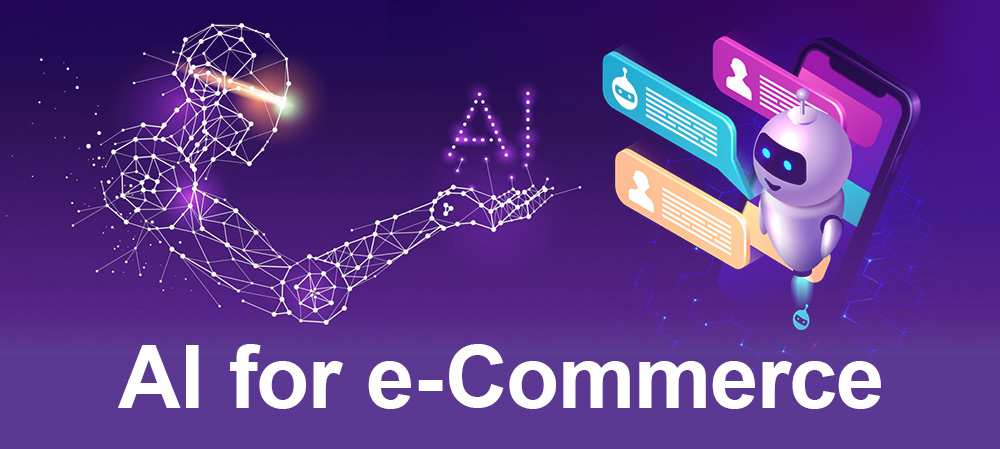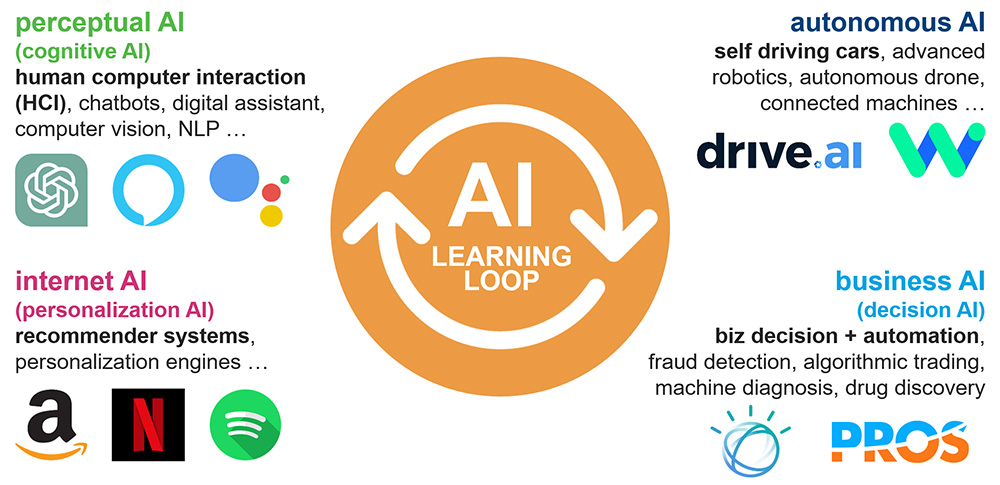4 Categories of AI for Your eCommerce Differentiation
Despite the chaos and havocs many businesses have endured, the pandemic has created an opportunity for leaders to change how their businesses compete in the market. Since one of the emerging trends of the “new normal” is being virtual, remote, and touchless, digital engagement and digital selling between businesses and customers have dramatically increased, resulting in skyrocketing eCommerce sales.
While digital transformation has long been an effort undertaken by many global enterprises, the 2020 pandemic has greatly accelerated these digital initiatives. The challenge today lies in differentiating your eCommerce model in an increasingly crowded digital market. So, how can a business stand out in this vast digital economy? For those that have succeeded, the secret ingredient is almost always Artificial Intelligence (AI).
Getting started with AI can be a daunting task, with thousands of tools and applications available to choose from. Despite this, a majority can be classified into 4 areas that are of paramount importance in today’s digital world. Some of them are more developed for eCommerce, while others have yet to realize their full potential. Here is how each category of AI has been used in eCommerce and why it’s crucial to the success of your eCommerce strategy:
1. Internet AI: Developing relevance and personalization
The first category is called Internet AI, as the data used to train this type of AI has traditionally derived from user behaviors on the internet. This category is also referred to as Personalization AI, because the primary use case supports recommender systems and personalization engines. Internet AI is already widely used in eCommerce to provide personalized recommendations of products and services.
With eCommerce lacking the traditional in-person interactions, personalization will be crucial to provide users with relevance and individualized context to improve the user experience. Remember, it’s not about being online or offline anymore. Everyone is going online, even your competitor next door. What is now essential is that once online, you need to tailor the experience to each individual customer as much as possible. Because the attention economy is far more competitive in the digital world.
2. Perceptual AI: Creating an engaging end-user experience
The second category is called perceptual AI, with the dominant use case of this class of AI being human-computer interaction. Virtual assistants (e.g. Cortana, Google Assistant, and Siri), as well as chatbots (e.g. ChatGPT or other conversational AI on websites), are just some examples of this class of AI. Because these tools often require machines to mimic the higher cognitive function of humans, like speech recognition and language understanding, this category is also known as Cognitive AI.
The proliferation of conversational agents made perceptual AI extremely popular in eCommerce. Since most eCommerce sites are relatively static and lack the engagement of physical shopping experiences, perceptual AI can make your eCommerce shopping experience far more interactive and engaging. As a result, many websites, whether eCommerce or not, are implementing chatbots to help visitors navigate more efficiently and guide them to the information they are looking for. Perceptual AI can also be coupled with Internet AI to recommend products via conversational agents to create an engaging and guided user experience that is also relevant and personalized.
3. Business AI: Delivering commercial results
The third category is called Business AI because it’s typically used by business users instead of end consumers. Business AI is a very diverse category with many different domains in which it operates. Yet the overarching use case of this class of AI in business is to automate decision-making within a company. For eCommerce, examples of these decisions may be: How do we set the price for a certain product? How long do we run a particular promotion? How much discount do we offer to our most loyal customers?
Although every important business decision should be supported by data, most business operations are far from this ideal, especially with unstructured siloed data being the norm. Where data-driven decisions are feasible, Business AI solutions will access all the relevant corporate data, perform the necessary analyses, and produce an optimal decision with the option to automate its subsequent actions. This automation can improve productivity, reduce costs, and free up time for teams to focus on value-added tasks, such as customer relations or handling complex situations. Business AI can help you deliver results more consistently amongst significantly disrupted demand and improve margins in many industries.
4. Autonomous AI: Enhancing last-mile delivery
The last category of AI is called Autonomous AI because this is the kind of AI that powers the self-driving car and other autonomous systems such as robotics, autonomous drones, and systems of IoT devices. Although Autonomous AI is mainly used to drive autonomous vehicles today, it offers a huge opportunity for the eCommerce industry. Today’s consumers are able to explore, research, configure, and purchase products or services online, but not all of them are downloadable with a click of a mouse. There is often a lengthy post-purchase process to either receive the physical goods or deliver a service in the physical world, often performed by humans. This is known as the ‘last mile’ delivery problem. And Autonomous AI is perfect for bridging the gap between the physical world and your eCommerce in the digital world.
The rollout of autonomous AI helping eCommerce automate this last-mile delivery of physical goods has already begun, with food and package delivery robots, for example, Starship and Kiwibot, appearing on select campuses and cities. Amazon is already experimenting with drone delivery in UK‘s remote areas. Moreover, since robots can be sterilized easily, these contactless delivery mechanisms will likely grow in demand in a more hygiene-conscious, post-pandemic world.
Standing out from the crowd with AI
Amazon is perhaps the best example of an enterprise leveraging all 4 categories of AI effectively throughout the business to maintain its leadership position in eCommerce. As an early pioneer of Internet AI, Amazon has developed its famous recommender system: “Customers who have bought this item also bought.” Amazon also uses Perceptual AI in its speakers and mobile app through Alexa. Although less apparent to the end consumer, Amazon makes extensive use of Business AI to price its products. A report in 2013 noted that Amazon performs about 2.5 million price changes a single day. Taking into consideration the inventory level back then, this is about a price change per product every 10 min, on average. This is how the eCommerce giant is able to match the dynamic market demand constantly to optimize its revenue in real time. Lastly, Amazon is already using Autonomous AI for robots in its warehouses to transport products to be inventoried, processed, packaged, labeled, and shipped. And, it is experimenting with delivery bots and drone delivery.
AI offers huge potential for growth within commerce; it is now down to businesses to choose the best solution that will best serve customers and stand out virtually in the digital world of eCommerce. Adopting the right AI systems in your eCommerce strategy will not only help you differentiate from competitors, but it will also make your business more robust and resilient than ever for the years to come.
DISCLAIMER: The majority of the content of this article was first published by Ecommerce Age. Here is the latest revision and a current rendition of the raw manuscript submitted to the publisher, which differs slightly from the previously published version.




